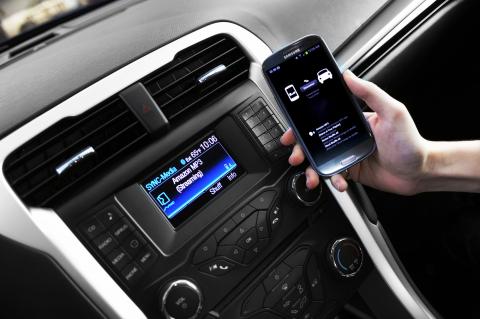
- Young drivers say texts and calls from parents and family members asking their whereabouts are one of the biggest distractions when they’re on the road – according to a new Nielsen survey
- Half of young drivers say in-car phone interruptions come even after they’ve told their parents and family members where they’re going and that they’ll be behind the wheel
- Ford offers several ways for parents to stay safely connected with their kids behind the wheel – a “Do not disturb” feature on Ford SYNC®-equipped vehicles blocks incoming calls and texts, diverting calls to voicemail and saving texts for later
Helicopter parents texting and calling their kids behind the wheel ranks among young drivers’ top perceived distractions, according to a Nielsen survey.
One in three young drivers say they are distracted by texts and calls from parents and family members asking their whereabouts. The drivers say these types of interruptions are more distracting than being contacted by friends.
The Nielsen survey, commissioned by Ford, found half of these youngdrivers report telling their parents or family where they’re going – or that they’ll be on the road – before even starting the ignition.
But still, parents continue to blow up their phones.
Families of adult drivers reach out to their loved ones on the road, too. One in five drivers across all ages report being distracted when they’re behind the wheel by calls and texts from family members. For these drivers, only low-visibility conditions and text messages and calls from friends rank as higher perceived distractions. Other distractions these motorists report include bad drivers, traffic, deciding what music to listen to, obstacles in the road and monitoring blind spots.
Research indicates that visual distraction is the primary contributor to distraction-related crash risks, while the research also finds that normal listening and talking among adults in the car does not raise risk nearly as much.
Ford recommends all drivers keep their eyes on the road and hands on the wheel as much as possible so they are better able to react to the changing demands driving situations bring. And Ford provides several ways to keep parents connected safely with their teen drivers:
- Ford SYNC® offers hands-free dialing and other voice-activated services to help drivers keep their eyes on the road and hands on the wheel
- SYNC-equipped vehicles offer “Do not disturb,” which works when a driver has connected his or her smartphone to SYNC with MyFord Touch® or SYNC; the feature blocks incoming calls and texts – diverting calls to voicemail and saving texts to be read later.
- To help parents promote good driving habits in their teens and to better put their minds at ease, Ford’s standard MyKey® feature allows them to control one or more keys to configure vehicle settings. MyKey can be configured to provide alerts at certain speeds, limit a vehicle’s maximum speed and radio volume, put a paired phone into “Do not disturb” mode, and encourage front safety belt use through persistent Ford Belt-Minder® that sounds chimes and mutes the radio until both driver and passenger belts are fastened
The survey also found that many young drivers admit to sometimes initiating conversations with their parents. Among all drivers, 20 per cent report initiating calls to family on the road.
If a young driver must make an outgoing call, hands-free dialing and conversations that are short and argument-free make sense to help keep kids behind the wheel safely in sync with their parents.
The Nielsen survey polled 1,222 respondents in the United States, aged 16 and older.
Categories
- Log in to post comments

